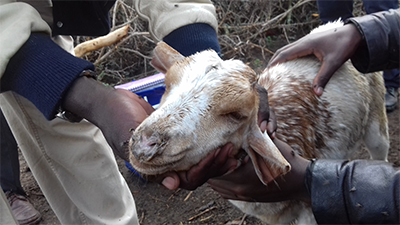The Royal Veterinary College (RVC) and SACIDS Foundation for One Health located at Sokoine University of Agriculture (SUA) in Tanzania are improving regional testing capacities for the devastating Peste des Petits Ruminants Virus (PPRV). PPRV emerged in East Africa in the first decade of this century causing considerable livestock loss and hardship for pastoral communities.

PRV, known also as ‘goat plague’, causes severe gastrointestinal and respiratory disease in sheep and goats, with non-immune herds experiencing up to 90% mortality. It occurs in over 70 countries in Africa, Asia and the Middle East where it threatens 1.7 billion sheep and goats. Recent outbreaks have occurred in Bulgaria within the European Community, Central Asia, Middle East and East Africa.
Funded by a Soulsby Travelling Fellowship in One Health, Dr Camilla Benfield, Lecturer in Virology at the RVC, worked at SUA alongside Professor Satya Parida and Dr Mana Mahapatra from the Pirbright Institute and co-Investigators on the RVC led UK Research and Innovation Global Challenges Research Fund (GCRF) project: Pathway to Peste des Petits Ruminants Virus Elimination – methods for complex ecosystems. Their objective was to fulfil key objectives of the GCRF project, to strengthen the SACIDS capacity for diagnosis of this disease and improve research on PPRV in the region. State of the art scientific diagnostic methods were demonstrated for this virus. In addition, the needs for the future development of the lab were evaluated under an RVC led translational GCRF Award “Development of multispecies validated serology protocols for complex ecosystems, focused on East Africa in support of Global PPRV eradication.
A key focus of the work was the introduction of a novel diagnostic technique known as quantitative PCR (qPCR). qPCR is a ‘molecular test’ which detects PPRV genome from animal samples. This technique has not previously been used at SUA for PPRV diagnosis and it is much more sensitive than other tests, that detect viral proteins. qPCR is well known as the ‘gold standard’ diagnostic test for detection of PPRV in biological samples taken from suspected cases in any species affected.
The RVC worked seamlessly with SUA to make sure that the specialised reagents needed for qPCR were ready to go ahead of Dr Benfield’s arrival. The team analysed swabs from the eye and nose previously collected from wildlife and livestock within the Serengeti ecosystem to better understand the epidemiology of PPRV. Using these swabs, Dr Benfield and the other visiting scientists delivered training to three laboratory technologists to build capacity for PPRV detection using the qPCR method.
Dr Camilla Benfield, Lecturer in Virology at the RVC, said:
“PPRV is a scourge to small livestock farmers across the world. Sadly, the disease has a disproportionate effect on the income, livelihood and food security of the most vulnerable people.”
“During the project we did detect PPRV in some livestock samples, but we did not detect the virus in wildlife samples using the sensitive qPCR technique. The absence of PPRV in swabs from antibody-negative healthy wildlife supports, to some extent, the hypothesis that PPRV is not circulating within the population asymptomatically, but spilling over from livestock periodically. Further research is needed to understand fully the epidemiology of PPRV at the interface between livestock and wildlife.”
“This work has undoubtedly strengthened the partnership between RVC and SACIDS Foundation for One Health at SUA as we continue to work together sharing expertise and research projects for the ultimate benefit of livestock, wildlife and human health.”
Prof. Gerald Misinzo, Centre Leader of the SACIDS-ACE said: “Our smart partnership with The Royal Veterinary College and The Pirbright Institute of the UK provides SACIDS Foundation with an added advantage in addressing infectious diseases in the endemic settings of Africa. Apart from technology transfer, our postgraduate students benefit from mentorship they receive from the faculty who serve as cosupervisors.”
END.







